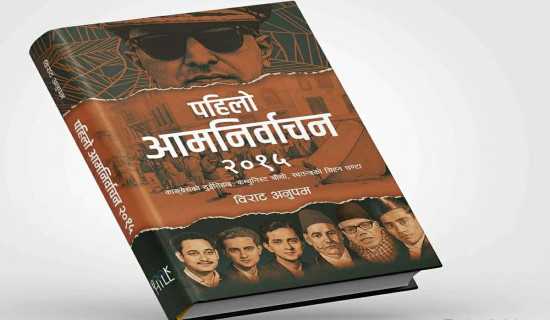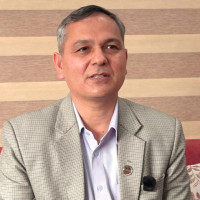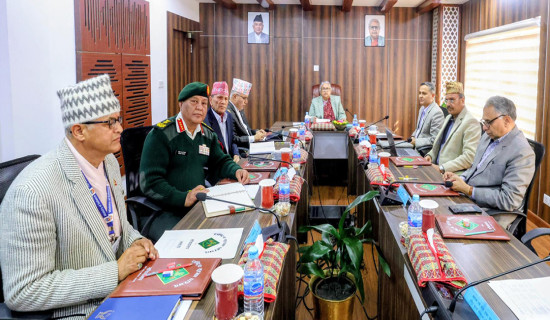- Wednesday, 4 March 2026
59thAnniversary Special Supplement
How TRN Distinguishes Itself From Other Media
Though the media landscape in Nepal has undergone a dramatic shift with the proliferation of digital platforms and private news outlets, The Rising Nepal (TRN) continues to play a critical role in shaping public opinion and contributing to informed citizenship. TRN stands out from other media outlets due to its unique characteristics and historical significance. It is published by Gorkhapatra Corporation, a government-owned entity. This gives it an official stance, often reflecting the policies and perspective of the government. Unlike private or independent media, its coverage is typically aligned with the state’s priorities, such as development projects, governance, and national unity. Its long history gives it credibility and a strong foothold in the national media landscape.
The publication emphasises nation-building, development, and cultural heritage, often avoiding sensationalism and commercial interest common in private media. Its content is generally balanced and stays away from controversy, as it aims to present a coherent national narrative. As one of the prominent English dailies, it targets English-speaking readers, including diplomats, expatriates, and educated Nepalis at home and abroad. This helps represent Nepal on an international stage by providing news and perspectives in a global lingua franca.
Cautious approach
It often takes a cautious approach in reporting political and sensitive issues, differing from the aggressive journalism of its private peers. However, this approach has both strengths and limitations, depending on the readers. It accords high priority to state viewpoints, developmental news, and official narratives, catering to a more policy-focused readership. It is less driven by advertisement revenue and sensationalism, maintaining a more formal and informative tone. The publication also boasts extensive archives of historical events, allowing researchers to delve into the rich tapestry of our nation’s past. When an annual photo exhibition is organised in its premises to showcase glimpses of such events, it draws a wide range of visitors from key national dignitaries to foreign diplomats.
Since its inception in 1965, TRN has served society in various ways. Its unwavering focus on responsible reporting on the things that really matter—from small yet important social and cultural events in far-flung areas to promoting sports from grassroots to professional levels, both national and international—has attracted a staunchly loyal readership. There have been countless examples of the positive change brought about by the stories carried by the daily: Factories best with multiple problems and so on the verge of closure get a new lease of life. Non-operational hospitals and health centres become functional after the government intervenes. Contractors spring into action to complete the long-delayed road and bridge construction. Victims of cooperative fraud receive justice. Those responsible for social injustice have finally been held accountable. The list goes on.
Every major sporting event finds due space here. Besides, the focus is also on national sports development, challenges, and achievements, rather than commercial or entertainment-driven aspects. This makes it a reliable source for those interested in the nation’s sports from an official and developmental standpoint. A multitude of responses it receives daily to be published under its ‘letter to the editor’ section is indicative of its impact and testament to its popularity. Whenever people feel the need to distinguish fake news from a real one, or a national stance on international issues, they still flock to government media like TRN and Gorkhapatra.
Despite their explosive growth, private media have failed to make a dent in its reputation. The stories it covers under its ‘Art/Culture’ section not only greatly contribute to promoting and preserving national cultures and heritages but also give ample space for rising stars of the entertainment sector. The paper is never short on space when it comes to highlighting the remarkable contributions of veteran artists and literary figures. Having earned fame and fortune once their struggles and stories got uncovered in these spaces, many of them have succeeded in getting international exposure and recognition.
What’s more, the publication is one of the most sought-after workplaces for emerging journalists, noted writers, gifted storytellers, and other creative and talented individuals. The fact that it gets a lot of articles from a variety of authors on a daily basis for their publication in the ‘Op-Ed’ section is evidence of its credibility. The ‘Editorial’ section featuring analysis and perspective written by well-informed experts after rigorous research on unfolding issues of national and international importance—along with their solutions and suggestions to the government—is another strength of the daily. Additionally, packed with every sort of business news, national and international news, designated corners for kids on specified days, and many more, TRN has something for everyone.
Pride
Working at TRN offers a unique blend of challenges and rewards that can make it a fulfilling experience. This role often involves shaping public narrative, disseminating crucial information, and supporting national development goals. Motivated by the desire to serve the public interest, media professionals here are committed to keeping citizens informed about policies, programmes, and public initiatives taken by the government, among others. Their work helps bridge the gap between the government and the public, fostering trust and transparency. The media also often focuses on promoting cultural heritages, national values, and unity, contributing to a sense of pride and identity.
Through campaigns on health, education, environmental conservation, and other societal issues, TRN aspires to bring about behavioural change. Examples include campaigns on vaccination drives, literacy programmes, or disaster preparedness. Covering significant national events or broadcasting messages during crises can feel like making a direct contribution to society. TRN has played a critical role during emergencies, such as natural disasters, pandemics, or conflicts, by disseminating accurate information and guiding public behaviour. It feels incredibly rewarding to be part of a team that helps ensure public safety during crises.
(Basyal works as a journalist at The Rising Nepal.)
















